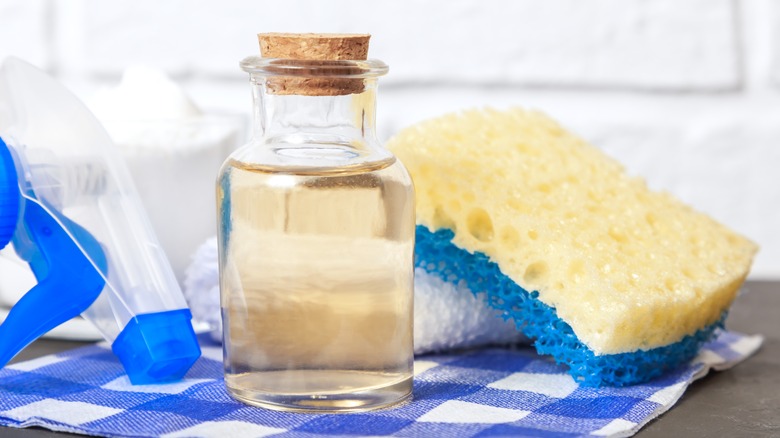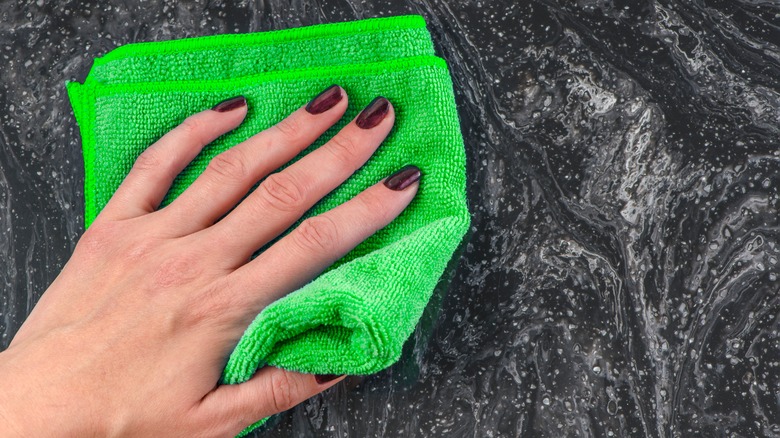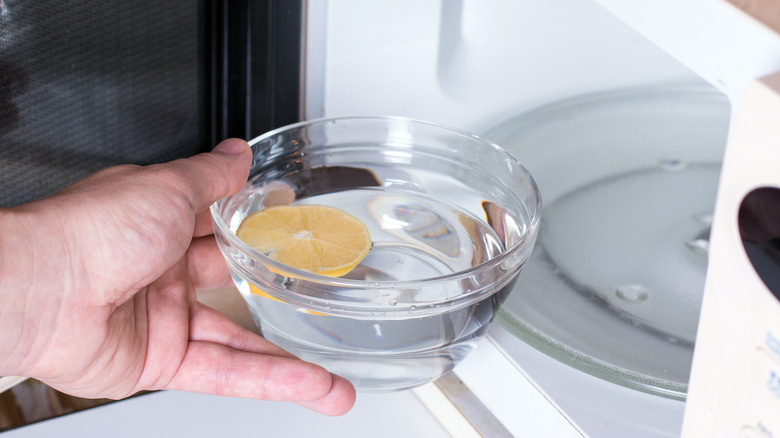Kitchen Surfaces You Shouldn't Clean With Vinegar
If you prefer to use eco-friendly and non-toxic cleaners, then you're probably hip to the fact that vinegar is more than just a tasty salad dressing ingredient. While you might already know how to clean your kitchen with just apple cider vinegar (or white if you prefer), you might not be aware that there are some surfaces you shouldn't use it on. The same qualities that make vinegar so effective at deodorizing and cutting through dirt and grime can also inadvertently wreak havoc on certain materials in your kitchen.
Natural stone, for instance, is one surface you definitely want to avoid using vinegar on. Vinegar's low pH means it's highly acidic, which can damage the stone's porous finish, causing dulling, etching, or pitting. This includes most types of stone such as marble, granite, slate, limestone, sandstone, or travertine used for countertops, floors, and more. Likewise, vinegar can also break down grout, which is usually a mix of cement, sand, and water. While the ceramic on your backsplash or tile floors might be able to withstand vinegar, the grout that holds it all together can be harmed with repeated exposure.
Wood floors, and all wooden materials for that matter, can be similarly ruined. This applies to your gorgeous hardwood floors (waxed or unwaxed), antique wood furniture, and even wooden handles on your knives. Vinegar will eat at the finish, leading to discoloration, streaking, scratches, and even a permanent odor if it seeps into or below floorboards.
Vinegar can damage natural and man-made materials
Natural materials aren't the only things you shouldn't clean with vinegar. While it's often touted as being effective at removing rust, which it is, vinegar can actually damage metals in other ways. Stainless steel knives, in particular, should not be washed or soaked in vinegar, as it can cause their delicate sharp edge to pit, deteriorate, and dull. Vinegar can cause similar problems for your stainless steel pots and pans, as well as any kitchen fixtures such as sinks. Aluminum and copper can also corrode with exposure to the acid, and it can literally strip away the protective coating on your non-stick cast iron skillet, ironically making it more likely to rust.
You'll also want to keep vinegar away from rubber. Many small kitchen appliances (as well as dishwashers and washing machines) have rubber parts, like hoses, gaskets, and door seals, which vinegar will eventually degrade. Although you may have heard it's a good idea to run vinegar through your dishwasher to get sparkling, shiny silverware, or in your washing machine to brighten and remove stains, doing so could lead to malfunctions that are expensive to repair. Despite what you might read on the internet, for best results use only gentle, manufacturer-suggested products in your appliances.
If you want to keep the screens on your TV, mobile phone, and computer monitors in good shape, do not wipe them down with vinegar. Doing so can impair their anti-glare coating and ruin touchscreen functionality.
Here's what's safe to clean with vinegar
Of course, there are cleaning purposes that vinegar is great for. It's important to remember that, while it removes dirt, vinegar is not a thorough disinfectant. It can kill some germs, including some that cause food poisoning, so it's good for wiping down plastic cutting boards and non-stone countertops. It shouldn't be relied on, however, as an all-purpose disinfectant like bleach or Lysol. On that note, mixing chemicals can create dangerous reactions, and vinegar should never be combined with bleach, which can release potentially deadly chlorine gas.
Vinegar is safe on most plastics and glass. It's great for getting cloudy drinking glasses crystal clear as well as for streak-free windows. Avoid using it on mirrors though, because it can corrode the reflective metal that's behind the glass. Laminate floors can also be cleaned with vinegar.
To get the inside of your microwave squeaky clean, pour one part vinegar and four parts water into a glass bowl, and heat it up until it starts to steam. Optionally, place some sliced lemons or oranges in the bowl for a fresh scent. Carefully remove the hot bowl and use a clean cloth to wipe away any stains or stuck-on food, which should come off easily thanks to the vinegar steam bath. You can also use diluted vinegar as a produce wash for fruits and vegetables. For example, a 3:1 ratio is the vinegar solution for perfectly clean raspberries.



